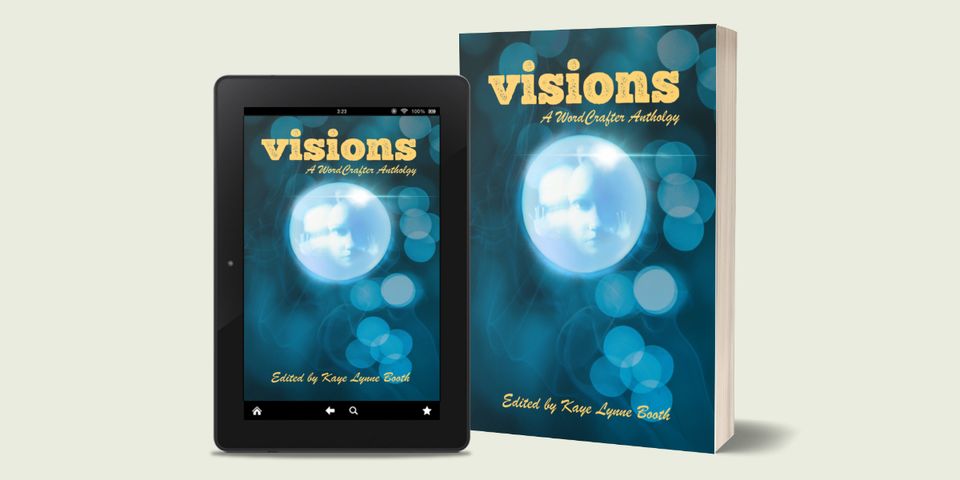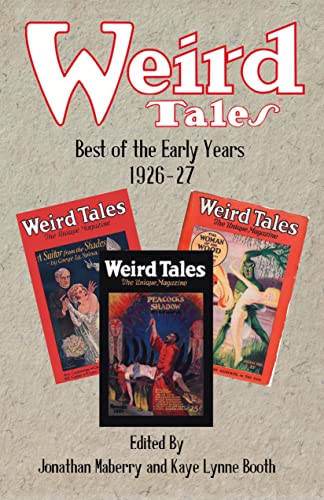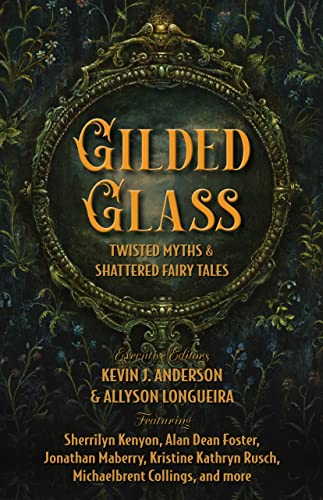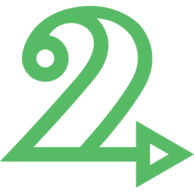Visions - Interview with the editor, Kaye Lynne Booth.

Kaye has recently co-edited two amazing collections with legendary authors Kevin J. Anderson and Jonathan Maberry.


Wes and I had submitted a story to Gilded Glass, which made it to the final selection stage out of 600 stories, but got cut at the very end. (So bummed!) This produced a very flattering, complimentary letter of praise for the story from three of the editors, and then Kaye Lynne Booth asked if I'd be willing to submit that story or other stories to her anthology Visions. (Yes, I would! Of course!)
Since then, we've become awesome friends and she's an endless wealth of knowledge and support. In this interview I thought I'd share some of her wisdom.
How did your latest anthology, Visions, come about?
From 2021 to 2022, I went back to Western State Colorado University to earn an additional M. A. in publishing. For that degree, I found myself on the editing team for the Gilded Glass: Twisted Myths & Shattered Fairy Tales, where we received over 600 submissions. There were so many good stories, and not all of them could make it into the anthology, so I kept a record of the ones I really liked and, after the decisions were made for Gilded Glass, I invited those on my list that weren’t chosen to be included in one of my anthologies. Every year, WordCrafter Press runs a short fiction contest, but this year in addition to the contest submissions that made it in, there are also some of those ‘by invitation’ stories, creating a larger anthology than in years past. Overall, we ended up with a diverse selection of excellent short fiction in Visions.
As an anthology editor, what do you look for in your story selection process?
First, I look for the stories that grab my attention and won’t let go, even long after I’ve put the pages, or the reader, down. The stories that follow me into my dreams and make me wake up thinking about them. The more your story makes me think, the more I like it. Next, I look for the ones that are ready for publication and are not going to require a lot of revisions. But if a story is really good, like keep me awake at night pondering it, I might be willing to use it, even if it needs a bit more editing.
What is your favorite genre to read and to edit?
I am very eclectic in my reading tastes, and I’m willing to read just about anything. And I’m willing to try my hand at just about any type of writing. I suppose it’s the same with editing, although I don’t think I have the right technical knowledge to edit hard science fiction.
What genre do you enjoy writing the most?
I’m a multi-genre author, and I haven’t tried my hand at all of them, so I can’t really say which is my favorite. I write western paranormal, fantasy, science fiction, time travel, original fairy tales, speculative fiction and poetry, as well as nonfiction.
What’s your favorite snack or beverage while writing or editing?
Pepsi. I’m a Pepsi-holic, who is trying hard to drink more water and stay away from the soda. I’ve been considering flavored seltzer water, and I’ve found one that I like a lot. I wonder if the flavor of my writing will change if I switch. Hmmm…
You always have so many projects going. Do you ever walk away from your computer for an entire day?
Not if I can help it. On days when I must work my ‘day job’, I’m often not on until evening, but I always try to at least keep up with emails and the blog, so I don’t get too far behind.
When you do step away from your screen of endless words, what do you love to do?
I’m an outdoor person and I love to fish, hike, birdwatch, work in my garden, ride bicycles & ATVs, backpack, etc…, but now that I’m getting older, I’m really enjoying soaking in the many hot springs Colorado is home to.
When reviewing stories for anthologies, is there anything that gets you super excited?
It always excites me when I come across a really great story, the kind of story my mind just won’t let go of. When I find those stories, I want to give them a home and publish them so they can be shared. All of the ‘by invitation’ stories in Visions are of that ilk, and we had some truly wonderful submissions to the contest, too. I was thrilled to declare Roberta Eaton Cheadle’s “The Bite” the winner of the 2022 WordCrafter Short Fiction Contest, because it was a different kind of story in which the reader doesn’t know what to expect, and it is proudly featured in the Visions anthology.
You’ve read hundreds, if not thousands of short stories. Have you become a master at predicting the ending of a story before you finish it?
Absolutely not. That is not a skill I try to hone. I don’t want to read stories where the ending is obvious. I like to be surprised. If I know what is going to happen, there is no point in continuing to read. The stories where I get to the end and I have to shake my head and say, “Wow. I did not see that coming.” Those are the stories that make it into WordCrafter Press anthologies.
What are some of the tell-tale techniques in a story that forecast the ending? In other words, what should writers avoid if they don’t want to be predictable.
Instead of trying to tell you how not to be predictable, I’ll tell you a few things one should think about when submitting a short story.
1. Editors have a lot of stories to look at when making anthology selections, so be sure your story is near ready for publication. For Gilded Glass, we had over 600 submissions. If your story needs a lot of editing work, they will most likely pass on it.
2. Follow the submission guidelines. This seems like a no brainer, but you’d be surprised how many submissions are not properly formatted or don’t match the theme, even when guidelines are clearly set. For Gilded Glass, we even received a submission of nude photos, and the editing team for the anthology before ours received holiday greeting cards.
3. Submit as early as possible to give your story a better chance of being read through. When approaching the submission deadline, editors are a lot quicker to turn a story down because they have read so many and have so many more to go. Submitting at the beginning means the editors will see your story while it is still fresh.
4. If the guidelines say 5000 words maximum, do not submit a story that is 5010 words, or even 5001. In the case of pay-by-the-word anthologies, they must stay within the budget that has been set, and extra words could throw you out of the running.
If you could edit any author, dead or alive, who would it be?
While earning my M.A., my solo project was to compile and edit a volume of the best stories featured in Weird Tales magazine in 1926-27. When you’ve edited H.P. Lovecraft, where else is there to go?
Do you take on editing clients? If yes, what services do you offer and how can someone contact you?
I do take on clients for editing and proofreading. I struggle with the affordability of such services for myself, so I try to keep my rates affordable for others. You can find my current rates and submit a contact form on the Write it Right Quality Editing Services page on my website.
What’s your favorite part about editing an anthology? Least favorite?
Favorite part – Reading all the stories, of course. Least favorite – worrying about spacing and em-dashes, en-dashes, and ellipsis. It is those little details that count in publishing a quality piece of literature, but man, they sure can be time consuming. What it comes down to is that you have to take the good with the bad, (and really em-dashes aren’t all that bad, just tedious), and I really enjoy what I do, so bring on the ellipsis. Let me at ‘em!
What is the worst piece of advice you’ve heard given to writers?
That traditional publishing is the only ‘legitimate’ way to publish a book. In fact, I think trad. publishers could learn a thing or two from indie publishers, if they weren’t so rigidly set in their ways. Independent publishing is “legitimate”, and there independent authors out there who are quite successful. They are not only making money from their books, but they are receiving regular royalties, instead of waiting for their payout twice a year from trad. publishers. We can’t all be Hugh Howey, but it is possible to publish your own book and make it successful if you’re willing to put in the work, and it's a lot of work. Anyone who tells you trad. publishing is the only way is a dinosaur in a rapidly changing world.
What great piece of advice can you offer to short story writers?
Read the submission guidelines!
Tell us about next year’s anthology and when & where can writers send their stories?
I announce the theme and post the call for submissions at the beginning of each year. I haven’t decided on next year’s theme yet, but I have a few interesting ideas, but you’ll have to wait until January for that. I can tell you that it will probably be a multi-genre call, like Visions was, because that seemed to get a wider response that my previous single genre calls did. And I am pleased with the results of the ‘by invitation’ stories I was able to include in Visions, so I may consider extending invitations to previous contributors and include those, or I may do that and create a separate ‘by invitation only’ anthology. To stay updated about the contest, other writing opportunities, and general writing advice and information, you can follow my blog, Writing to be Read: writingtoberead.com
If you could hang out with any famous ghost, who would it be and why?
Doc Holliday. I found I had a fascination for the history of the American west when I wrote Delilah. Doc Holliday was mentioned in that book and other historical figures, Horace and Baby Doe Tabor actually make an appearance. My research for my western series has taken me down many old west rabbit holes, and I’ve spent some time in Glenwood Springs, where Doc breathed his last breath, so I wouldn’t be a surprised if he shows up in future works. He’s a fascinating character. An educated Easterner, who came out west to be a gambler, living by the gun, maybe because he had nothing to lose. It would give me great pleasure to hang out with Doc for a day.
To purchase a copy of Visions, here's the link!


